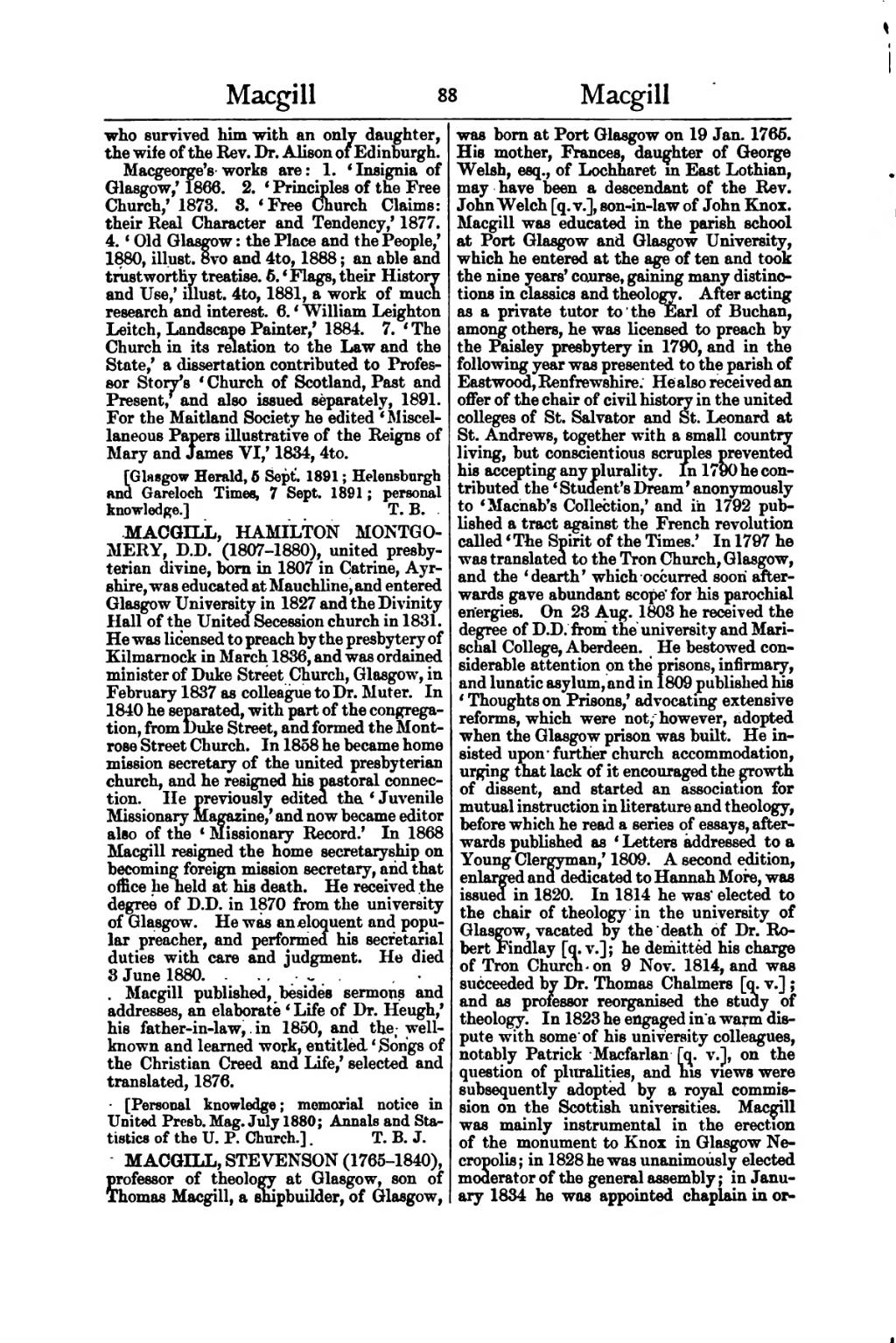who survived him with an only daughter, the wife of the Rev. Dr. Alison of Edinburgh.
Macgeorge's works are: 1. 'Insignia of Glasgow,' 1866. 2. 'Principles of the Free Church,' 1873. 3. 'Free Church Claims: their Real Character and Tendency,' 1877. 4. 'Old Glasgow: the Place and the People,' 1880, illust. 8vo and 4to, 1888; an able and trustworthy treatise. 5. 'Flags, their History and Use,' illust. 4to, 1881, a work of much research and interest. 6. 'William Leighton Leitch, Landscape Painter,' 1884. 7. 'The Church in its relation to the Law and the State,' a dissertation contributed to Professor Story's 'Church of Scotland, Past and Present, and also issued separately, 1891. For the Maitland Society he edited 'Miscellaneous Papers illustrative of the Reigns of Mary and James VI,' 1834, 4to.
[Glasgow Herald, 6 Sept. 1891; Helensburgh and Gareloch Times, 7 Sept. 1891; personal knowledge.]
MACGILL, HAMILTON MONTGOMERY, D.D. (1807–1880), united presbyterian divine, born in 1807 in Catrine, Ayrshire, was educated at Mauchline,and entered Glasgow University in 1827 and the Divinity Hall of the United Secession church in 1831. He was licensed to preach by the presbytery of Kilmarnock in March 1836, and was ordained minister of Duke Street Church, Glasgow, in February 1837 as colleague to Dr. Muter. In 1840 he separated, with part of the congregation, from Duke Street, and formed the Montrose Street Church. In 1858 he became home mission secretary of the united presbyterian church, and he resigned his pastoral connection. He previously edited the 'Juvenile Missionary Magazine,' and now became editor also of the 'Missionary Record.' In 1868 Macgill resigned the home secretaryship on becoming foreign mission secretary, and that office he neld at his death. He received the degree of D.D. in 1870 from the university of Glasgow. He was an eloquent and popular preacher, and performed his secretarial duties with care and judgment. He died 3 June 1880.
Macgill published, besides sermons and addresses, an elaborate 'Life of Dr. Heugh,' his father-in-law, in 1850, and the, well-known and learned work, entitled 'Songs of the Christian Creed and Life,' selected and translated, 1876.
[Personal knowledge; memorial notice in United Presb. Mag. July 1880; Annals and Statistics of the U. P. Church.]
MACGILL, STEVENSON (1765–1840), professor of theology at Glasgow, son of Thomas Macgill, a shipbuilder, of Glasgow, was born at Port Glasgow on 19 Jan. 1765. His mother, Frances, daughter of George Welsh, esq., of Lochharet in East Lothian, may have been a descendant of the Rev. John Welch [q. v.], son-in-law of John Knox. Macgill was educated in the parish school at Port Glasgow and Glasgow University, which he entered at the age of ten and took the nine years' course, gaining many distinctions in classics and theology. After acting as a private tutor to the Earl of Buchan, among others, he was licensed to preach by the Paisley presbytery in 1790, and in the following year was presented to the parish of Eastwood, Renfrewshire. He also received an offer of the chair of civil history in the united colleges of St. Salvator and St. Leonard at St. Andrews, together with a small country living, but conscientious scruples prevented his accepting any plurality. In 1790 he contributed the ‘Student's Dream’ anonymously to ‘Macnab's Collection,’ and in 1792 published a tract against the French revolution called ‘The Spirit of the Times.’ In 1797 he was translated to the Tron Church, Glasgow, and the ‘dearth’ which occurred soon afterwards gave abundant scope for his parochial energies. On 23 Aug. 1803 he received the degree of D.D. from the university and Marischal College, Aberdeen. He bestowed considerable attention on the prisons, infirmary, and lunatic asylum, and in 1809 published his ‘Thoughts on Prisons,’ advocating extensive reforms, which were not, however, adopted when the Glasgow prison was built. He insisted upon further church accommodation, urging that lack of it encouraged the growth of dissent, and started an association for mutual instruction in literature and theology, before which he read a series of essays, afterwards published as ‘Letters addressed to a Young Clergyman,’ 1809. A second edition, enlarged and dedicated to Hannah More, was issued in 1820. In 1814 he was elected to the chair of theology in the university of Glasgow, vacated by the death of Dr. Robert Findlay [q. v.]; he demitted his charge of Tron Church on 9 Nov. 1814, and was succeeded by Dr. Thomas Chalmers [q. v.]; and as professor reorganised the study of theology. In 1823 he engaged in a warm dispute with some of his university colleagues, notably Patrick Macfarlan [q. v.], on the question of pluralities, and his views were subsequently adopted by a royal commission on the Scottish universities. Macgill was mainly instrumental in the erection of the monument to Knox in Glasgow Necropolis; in 1828 he was unanimously elected moderator of the general assembly; in January 1834 he was appointed chaplain in or-
